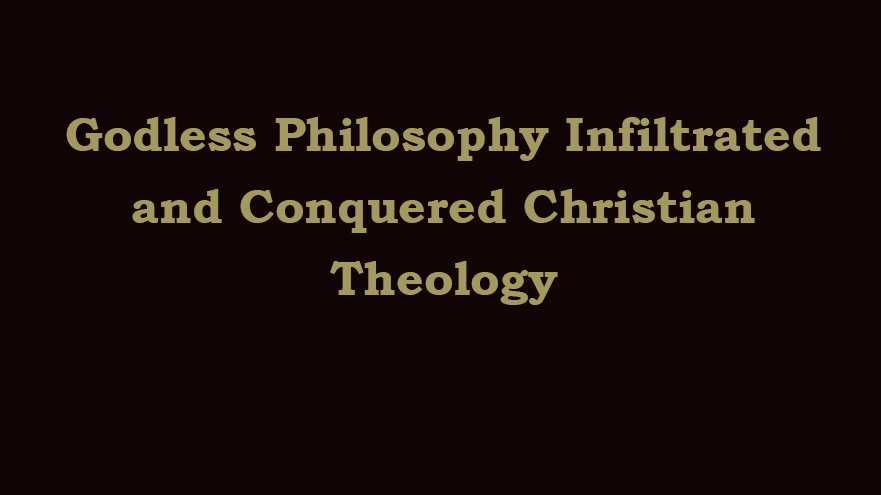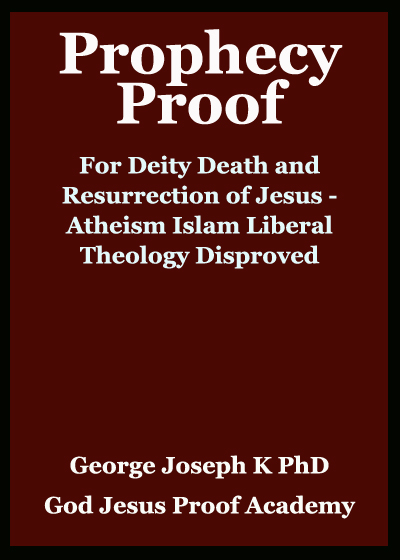
Godless Philosophy Infiltrated and Conquered Christian Theology
THE GROWTH OF SCIENCE IN THE ANTI-SUPERNATURAL ANGLES WAS MOTIVATED BY THE ANTI-SUPERNATURALISM OF THE SECULAR PHILOSOPHY, HIGHER CRITICISM AND LIBERAL THEOLOGY. The modern period in Western philosophy began with the Enlightenment. People began seeking in new ways in all fields. For example, in the 1600s, English physician William Harvey began opening human bodies and examining them. Thus Modern medical science was born based on the principle of first hand observation and learning.This same revolution was happening in other fields of science, too. Thus an age of reason was inaugurated with deep effect on the philosophers and theologians also.
GROWTH OF ANTI-SUPERNATURAL PHILOSOPHY.The increase in scientific knowledge gave rise to an increase in philosophical thinking. Reason gained pre-eminence at the cost of revelation. Scientific philosophizing led to empiricist, naturalist, and materialist forms of philosophy. The empiricists said that real knowledge is based on experience. The naturalists said that real knowledge is based on the natural sciences. And the materialists said that everything is matter, and real knowledge is based on the study of matter. All three of these approaches emphasized reason and scientific thinking--and took away the central role of revelation and Biblical theology in interpreting knowledge and reality.
BRITISH PHILOSOPHERS BEGIN ATTACKING GOD.ACTIVE THINKING ABOUT HOW PEOPLE KNOW. If matters of spirituality could be questioned, then why not question matters of reason also? And if reason could be questioned, why not also question our instincts and feelings? Thus the direction of philosophy continued to move toward areas not thoroughly discussed since the Greek philosophers. Some philosophers began to question the very process of perception and knowing. They asked how we perceive external objects and internal feelings and thoughts, and even whether or not our knowing is real. Descartes had said, "I think, therefore I am." Other philosophers took this one step further and asked, "How do I know that I think?" and "How do I know that I know?"
IN GREAT BRITAIN, PHILOSOPHERS ARGUED ABOUT HOW PEOPLE KNOW THAT THEIR PERCEPTIONS OF REALITY ARE TRUE. THE ENGLISH EMPIRICISM.Empiricism is the view that all knowledge must come from experience. This means that there is no such thing as knowledge a priori. Empiricism has its original roots among the Greeks, but it was in England that empiricism first made its rebirth in Western Civilization. The Empirical ideology of England formed the basis of the scientific method. Bishop George Berkeley argued that minds create reality. Reality does not exist except by the mind that perceives it at the time. It is from British Empiricism that we get the term “agnostic”. Gnosticism refers to an early Christian sect that believed in “divine knowledge” or knowledge without experience, that some people could “just know facts”. And such people in the name of special knowledge began to deceive credulous people.
THOMAS HOBBES (1588-1679). Thomas Hobbes is one of the early English empirical philosophers. While Hobbes was not an atheist, the relatively materialist and anti-supernatural nature of his work made him an enemy of the religious establishment. When Leviathan was published Hobbes became the most controversial figure in England.In Leviathan Hobbes laid out his view of the world, upon which he based his views on government. Hobbes concluded that individuals are motivated by self-interest to come together to form social groups in order to protect themselves from the risk of violent death by other individuals or nature. Hence the main function of government is to protect the people. For government to perform its duty properly it had to be all powerful and beyond question.
JOHN LOCKE (1632-1704). John Locke suggested that the mind is like photographic film, which takes an exact picture of reality around it. To him, Matter creates mind. The mind is white paper. Knowledge is transferred from reality to the mind. Locke made the argument that people are not born with innate knowledge or ideas, and that everything that people know comes from our experiences. This was an argument against the idea that a human soul possessed knowledge of universal truth. Locke argued that people are not born with any universal set of ideas at all, but that agreement comes from the common observation of the same material reality. John Locke influenced the founding principles of the United States of America. Unlike Hobbes, however, Locke advocated government by the consent of the governed.
DAVID HUME (1711-1776). David Hume said that mind and matter interact to create what people think is reality. Sense experience and mental impressions both are imperfect and must be examined together. Hume is the most atheistic of the early empiricists. Unlike Hobbes and Locke, Hume didn’t make room for God in his views. Hume argued philosophically against the idea that the universe was designed by an intelligent creator. He also developed an early theory of natural selection to explain the development of the universe and all life before Charles Darwin was even born.
THEY BEGIN DOING WITHOUT GOD. So with Hume and with other philosophers who were beginning to appear during this time of scientific enlightenment, atheism became philosophically acceptable. This was a huge change indeed for philosophy and for the world. And the thinkers philosophically had destroyed belief in everything. Berkeley had said there was no matter, and Locke and Hume led one to the conclusion that there is no mind, either.
IMMANUEL KANT MARKS THE SHIFT FROM REASON TO CONSCIENCE, FROM ENLIGHTENMENT TO ROMANTICISM. Kant made no claims to being a Christian. But Kant was not an atheist. He postulated the existence of God, but denied the possibility of any cognitive knowledge of him. He did not try to justify or destroy faith in God based on reason. In fact, he said that pure reason alone was in no way at all capable of proving the existence of God. However, Kant did not say that reason could disprove God, either. He simply said reason was not enough to accept or reject God. Instead, Kant turned to moral belief or conscience for justification of God. Kant argues that we must listen equally to the voice of feeling - CONSCIENCE within us. This voice of feeling has its own reality, which can deliver knowledge to us just as certainly as the voice of pure reason. Immanuel Kant marks the watershed between the Enlightenment and the Romantic period which followed. In a very real sense Kant is the last of the Enlightenment philosophers. But as an enlightenment philosopher his Critique of Pure Reason destroyed the hubris of the Enlightenment program of seeking all knowledge through the use of reason. As Copernicus changed the way scientists thought about the solar system, Kant revolutionized the way that modern man understands reality. Thus since the time of Kant that few philosophers try to justify belief in God by arguing it using reason. Since the time of Kant, most serious arguments about God have been based on the life of feeling--not the life of reason. Before Kant, philosophical epistemology had generally been divided into two camps, the idealists who saw ultimate reality in the mind (rationalists) and the empiricists who said ultimate reality in the physical universe. Kant asserted that neither side of the debate was right. Instead human knowledge arose from the interplay of incoming sensory data (absorbed through the five senses) and innate categories built into the human mind which processed that data and in turn made it “knowledge.”
KANT WAS SPIRITUALLY BLIND. Kant further held that reality was to be divided into two realms, the phenomenal (the created order in which we live and which is open for us to experience) and the noumenal (spiritual, metaphysical reality). God inhabited the noumenal realm and thus could not be experienced by man. Thus in Kant’s system there were no categories by which to receive data from the spiritual (noumenal) world, and hence, humanity is like the blind man. Man has no organ or faculty to receive the spiritual light which surrounds him.
IMPACT OF KANT. Some of Kant's speculations also were developed by Georg Wilhelm Friedrich Hegel, 1770-1831, who in turn was a major influence on Karl Marx, 1818-1883, the political philosopher who helped start communism. Since Kant, the most important single movement in Western philosophy has been that loosely termed as "existentialism.
HEGEL: THE PHILOSOPHER OF THE BECOMING BY DIALECTICS. G.F.W. Hegel, a contemporary of Schleiermacher gave the dominant shape to idealistic philosophy during the nineteenth century. A philosopher of history and religion Hegel proposed that all of reality is the outworking of Spirit/Mind. History is the objectification of Spirit, that is Spirit/Mind is working itself out in the historical process. So history carries its own meaning. From this it follows that there is a continual upward progress in history. History is undergoing a continual cultural and rational evolution, being pushed and pulled upward toward its final form by means of the dialectic. Hegel saw historical evolution in terms of a pendulum swing between opposites (thesis-antithesis) which resolved themselves (synthesis) in a position that was higher than either of the opposites. The synthesis then became a new thesis in the upward pull of the historical process. This philosophy of Hegel influenced Marx in his formulation of dialectical materialism, class struggle etc. Whereas philosophy had traditionally been occupied with the concept of BEING Hegel substituted the process of BECOMING. Because all of history was seen as the process of the objectification of Spirit, and human beings were a part of the historical process, all human knowledge was said to be Absolute Spirit thinking through human minds. An example of how Hegel saw this dialectic working itself out can be seen in his philosophy of history. The original thesis was the Despotism of the ancient period. The antithesis to Despotism was seen as the democracy of ancient Greece. The higher synthesis of these opposing forces was understood as Aristocracy. Aristocracy in turn became the new thesis which was opposed by Monarchy.
HEGEL AND LIBERALISM. According to Barth, Hegel held sway until the catastrophe of 1914, World War I. His philosophy of history gave the structure adopted by the emerging schools of biblical criticism, as well as the mental cast to the entire century. Hegel’s philosophy is the philosophy of self-confidence. The optimistic slogan that characterized the late nineteenth century Liberalism, “Every day in every way we are getting better and better,” reflects that optimism. This kind of arrogant and ungodly optimism led to the second world war, holocaust etc.
WAR BETWEEN REVELATION, RATIONALISM AND ROMANTICISM. THE BIBLE, REVELATION AND CHRISTINITY WERE ATTACKED BY REASON AND RATIONALISM. One of the first modern philosophers of reason was Rene Descartes. He is sometimes is called the father of modern philosophy. Descartes, Bacon, Spinoza and Voltaire, all proposed philosophies that made reason important. This development of reason instead of revelation as a basis for philosophizing continued in new forms. No longer could a philosopher simply say, "God exists," and then continue from there. No matter what he or she believed, he had to explain the purpose and uses of rational thinking in any kind of philosophizing.
RATIONALISM AND EMPIRICISM ATTACKED EACH OTHER. European philosophy was a war-torn field in which struggled the forces of Rationalism and Empiricism. Rationalists including Descartes, Leibniz, and Spinoza had composed massive treatises demonstrating that human mind could perceive the nature of ultimate reality and prove the God’s existence by the sheer power of logic. Empiricists including Berkeley, Locke, and Hume rejected Rationalism and asserted that truth can be known only through sense perception.
ROMANTICISM FOCUSSED INSTINCTS AND FEELINGS – ATTACKED RATIONALISM AND EMPIRICISM. The movement of Romanticism arose declaring that human instinct and feeling are more important than reason. Rousseau provided a philosophical basis for Romanticism. Kant also supported the view later. Romanticism was a reaction against the rationalism and empiricism of the Enlightenment, and asserted the importance of instinct and feeling. Thus it was theoretically proved that if religion could be thrown out by reason, reason also can be thrown out, replaced with feelings. For the Romantic revolution instinct and feeling are more trustworthy than reason.
THIS AGE WITNESSED THE RISE OF DEISM. Deism asserted that while God was indeed the creator, He had created a universe which operated by an absolute natural law. God himself would not interfere with his creation. Miracles were considered impossible, because miracles would violate the inviolable laws of nature. They falsely concluded that God himself will not interfere in the affairs of the creation.
RISE OF ANTI-BIBLE LIBERAL THEOLOGIANS.Secular atheistic Philosophers migrated to theology. During this age there arose a group of scholars who pioneered the work in Biblical criticism, attacking the doctrine of biblical inspiration. They attacked the supernaturalism of historic Christianity in general and such doctrines as the trinity, the deity of Christ, the atonement, the virgin birth, the resurrection, and the existence of Satan.
BENEDICTO SPINOZA (1632-1677). Spinoza was born in Amsterdam to a family of Portuguese Jews who had fled there to escape the Portuguese Inquisition. He is considered a major Enlightenment philosopher and a major contributor to the ideas of liberalism, democracy, and religious tolerance. Spinoza was excommunicated from his synagogue for challenging orthodoxy. He is considered the father of modern Biblical criticism and a major contributor to Pantheism, which holds a view of God as the physical universe.
KANT, SCHLEIERMACHER AND RITSCHL – RATIONALIZING FEELING, EXPERIENCE AND SUBJECTIVITY. father of liberal theology, SCHLEIERMACHER’S GOD CONSCIOUSNESS IS CLOSER TO HINDUSIM, NEW AGE AND YOGA THAN BIBLE. It is generally agreed that Friedrich Daniel Ernst Schleiermacher (1768-1834), is the founder of Protestant Liberalism. His major views were: The Enlightenment criticism of the Biblical Christian faith is right. The days of believing in an inerrant Scripture and the traditional dogmatic theology are over. The German romantic is better Christian faith than the rationalistic religion of the Enlightenment.
SCHLEIERMACHER MOVED FROM ROMANTICISM VIA FEELING, EXPERIENCE, SUBJECTIVISM, RELATIVISM, AND BECAME THE FATHER OF MODERN LIBERAL THEOLOGY. Schleiermacher was drawn into the Romantic Movement which arose in reaction to the critical and analytical rationalism of the eighteenth century. Romanticism stressed the intuitive nature of human reason insisting that truth was to be gained by grasping the whole rather than by an abstract reasoning and analysis of the parts. Schleiermacher influenced by Romanticism, found a new seat for religion and theology, the feeling. This feeling is not mere emotion. Rather it is the deep inner sense of man that he exists in a relationship of absolute dependence upon God. It is his “god-consciousness”. This is the center of religion and piety. BUT THIS MARKED THE BEGINNING OF A BIG PERVERSION IN PHILOSOPHY AND THEOLOGY. In taking this route, religion was seen at its core as subjective. Individual experience was seen as giving rise to doctrine not doctrine to experience. Thus the role of objective revelation was neglected. Theological statements no longer were perceived as describing objective reality, but rather as each person’s feeling about God.THUS PERSONAL EXPERIENCE AND FEELING BECAME THE FINAL AUTHORITY IN RELIGION RATHER THAN THE OBJECTIVE REVELATION OF THE INERRANT BIBLE.
SCHLEIERMACHER’s view is identical WITH THAT OF YOGA HINDUISM – GOD CONSCIOUSNESS AND SELF REALIZATION. For Scheleiermacher, Jesus Christ was unique, because he demonstrated a perfect God-consciousness. Schleiermacher believed Jesus was sinless and perfectly God-conscious, but this is possible to all human beings. He rejected and explained away the deity, virgin birth, death and resurrection of Jesus Christ. Redemption was the inner transformation of the individual from the state of God-forgetfulness to the state of God-consciousness. THIS IS SIMILAR TO THE HINDU YOGA VIEW OF SELF REALIZATION AND ENLIGHTENMENT THROUGH WHICH MAN BECOME CONSCIOUS THAT HE IS GOD.
FROM OBJECTIVITY TO SUBJECTIVITY.Schleiermacher believed that it is not possible to verify the historical events described in the Scriptures. Hence to him, faith is merely a “religious feeling.” Religious truth is subjective; it is not derived from the Scriptures but rather is relative to a person’s conscience. Consequently, religious principles of right and wrong are merely interpretations based on an individual’s perspective.
HIS THEOLOGY WAS MERELY AN ECHO OF THE CURRENT PHILOSOPHICAL TRENDS. Schleiermacher compromised with the prevailing spirit of the anti-supernaturalist critique of the biblical record. He rejected orthodox Christianity. He contended that the essence of religion was neither in belief/knowledge nor in morality/ethics but in feeling, more specifically, an immediate consciousness of absolute dependence on God and consequent union with Him. THE DANGER IS THAT EVEN DRUG COULD CONTRIBUTE THIS EXPERIENCE. Religious authority was to be located in the personal experience of each individual only. He even rejected the view of Kant the essence of religion is morality. To him the essence of Religion is a special kind of intuitive feeling of the Infinite, the personal God-consciousness. Just as Kant rejected miracle and dogma as irrelevant to his religion of pure morality, Schleiermacher rejected as irrelevant any traditional doctrine that cannot be translated into personal experience. To Schleiermacher miracles were violations of natural law and hence not acceptable. To him the whole nature was miracle.
RITSCHL’S DANGEROUS THEOLOGICAL AGNOSTICISM AND MORALITY BASED IN SUBJECTIVE DECISIONS AND EXPERIENCE. Albrecht Ritschl (1822-1889) saw religion in terms of mere morality based on mere subjective experience.Religious truth was based in the subjective moral-ethical judgments of the individual. Ritschl separated religion and theology from philosophy and metaphysics, making religion strictly upon experience. "Theology without metaphysics" became the watchword of the entire school. He agreed with Kant in his assertion that the only knowledge available to mankind was that of experience, the phenomenological.Knowledge of God fell outside the possibility of human experience. Hence to them no positive assertions concerning the nature of God could be made. Thus Ritschlianism represented a "theological agnosticism." Religious truth was no longer to be found in objective, verifiable propositions but in the realm of the subjective experience. They gave no definite objective propositional knowledge.
EXPERIENCE BASED THEOLOGY WITHOUT METAPHYSICS – FALL INTO AGNOSTICISM. Whereas Schleiermacher was mystic, seeing the center of religion in the feeling, AlbrectRitschl was more closely tied to Kant and saw religion in terms of mere morality and personal effort in establishing the Kingdom of God. Religious truth involved moral-ethical judgments which were subjectively determined by the individual. This scheme surrendered rational knowledge of God and things divine. Employing the epistemology of Kant as a foundation, Ritschlianism sought to separate religion and theology from philosophy and metaphysics, founding religion strictly upon phenomenological experience. "Theology without metaphysics" became the watchword of the entire school. Kant had asserted that the only knowledge available to mankind was that of experience, the phenomenological. With this proposition the Ritschlians agreed. Following in the Kantian tradition, the Ritschlians asserted that human knowledge was strictly limited to the world of the phenomena, a world which included the realm of verifiable history and the realm of personal experience. Knowledge of God as He was in Himself, His essence and attributes fell outside the possibility of human experience, so, no positive assertions concerning His nature could be made. This was how Ritschlianism represented a "theological agnosticism." Religious truth was no longer to be found in objective, verifiable propositions but in the realm of the subjective experience, in "value judgments". These "value judgments" were of a different nature than scientific knowledge. They gave no definite objective propositional knowledge, rather they set forth their subjective value for the individual.
HARNACK MARKED THE APEX OF LIBERAL THEOLOGY BY DENYing THE JEWISH BIBLE AND GOD due to ANTISEMITISM. Adolf von Harnack (1851-1930) represents the apex of liberal theology. Anti-Semitism made him to deny the Jewish Bible and God.He argued that the task of the theologian was to get back to the kernel of the gospel by stripping away the husks. According to him, ultimately the Gospel dealt with the Father only. The essence of Christianity is, The Fatherhood of God, The Brotherhood of Man and the infinite value of the human soul. He proposed to exclude the Old Testament from the canon of the German Evangelical Church. According to his theories, the god of the Hebrew Scriptures was a tribal war god, jealous for his subjects’ worship and waging war on his enemies. The Jewish belief that God required atonement for sin was dismissed as originating from the primitive belief in a tribal god who needed blood to satisfy his wrath. Harnack maintained that the Christian teaching that Jesus’ death atoned for sin was Hebrew in origin, obsolete, and should be discarded. Over time he gave up faith claiming that Jesus was not divine.
SUBVERSION OF REVEALED THEOLOGY BY NATURAL THEOLOGY
THE DEFECTS OF GENERAL REVELATION BASED NATURAL THEOLOGY OR PHILOSOPHICAL RELIGION ARE TO BE TAKEN TINTO ACCOUNT. A basic understanding of God can be gained from the natural world. From the created world we can see “his eternal power and divine nature”. This is “general revelation”. Natural theology can cause someone to theorize that God is invisible, omnipotent and wise, but these are all abstract characteristics of an unnamed “Supreme Being.” The mind of man is corrupted by sin and needs renewal. The sin and fall of man has affected the whole person, including the intellect. A reliance on natural theology assumes that human reason has not been tainted by original sin. Due to the fallen state of our intellect, we cannot properly interpret the nature without God’s special revelation. We need God’s gracious intervention to find our way back to Him. Hence special revelation of God in the Bible and in Jesus Christ is needed for salvation.
GENERAL REVELATION BASED NATURAL THEOLOGY IS THE BASIS OF ALL PHILOSOPHY AND RELIGIONS. Difference between Christianity and all the other religions is that Christianity is totally God-given revelation knowledge based, God-given, not man-generated. General revelation is the discovery of certain GENERAL attributes of God through the study of creation. Natural theology is the study of God based on the observation of nature, as distinct from “supernatural” or revealed theology, which is based on special revelation. Because observing nature is an intellectual pursuit, natural theology involves human philosophy and reasoning as means of knowing God.
GOD ORIENTED PHILOSOPHY OR NATURAL THEOLOGY GRADUALLY GROW INTO RELIGIONS REJECTING THE TRUE GOD. But we can get a rough idea of its meaning by observing that it comes from two Greek words: philein, which means “to love,” and sophia, which means “wisdom.” So philosophy is just the love of wisdom; Man’s search for truth. It is man’s attempt to find answers to the most important questions of life. But when man begins to worship on the basis of his philosophical findings, it becomes religion. The outputs of value loaded reason such as religions, theologies and philosophies will be anti-Bible theories. All religions contain methods, rituals and practices for man to become righteous enough to ascend or evolve to God. All religions thus believe in the need for one to become self- righteous. But true Christianity is the complete opposite. True Christianity believes in God's righteousness. Because of His righteousness, Jesus the creator, died for our sins and breached the gap between God and man. True Christianity believes God provides a free gift of eternal life to anyone who trusts in Him (has faith) that God is graceful and sent His Son to save those who believe in His righteousness.
THE STORY OF EARLY PHILOSOPHY AND RELIGION.Written philosophy developed in several places in the world independently. In fact, written philosophy began at about the same time civilizations began to keep written records. In the West, the Greeks developed the first major philosophical systems starting about 600 B.C. Towering figures in philosophy--Socrates, Plato, and Aristotle (ca. 470-322 B.C.)--soon followed. Plato developed orderly systems of philosophy for moral, political, aesthetic (the arts), intellectual, and spiritual behavior. Aristotle, though Plato's pupil for twenty years, developed a different philosophy that emphasized human reasoning, de-emphasized belief in souls or eternal forms, and was more interested in analyzing and classifying what already exists in reality.
In the nearby Middle East, Jewish religious writings as Bible formed foundation of Judaism and Christianity. Christianity, Judaism, and Mohammedanism all have some stories in common. Christians, Jews, and Muslims differ in a significant belief as to who is most important in their religion. The Muslims, of the most recently founded religion of these three, believe that Mohammad was God's greatest prophet. Christians believe that Jesus was the greatest prophet (and the Christ). Jews believe that Moses was the greatest prophet.
In China and India, great philosophical systems also were developing at about this time in the history of the earth. In China, great philosopher Confucius, 551-479 B.C., (known in China as Kung Fu-tse), a government worker, took these philosophical considerations a step further and developed a system that taught how the individual should operate within government and society. A very different system of philosophical and religious thought--Taoism--developed at about the same time. It emphasized union with the "Tao" or "Way of Nature" and encouraged individual freedom and communal farming. It was started by Lao-tse (Lao-tsu), ca. 604-531 B.C.
In India, philosophical systems of thinking had been handed down by oral tradition for centuries. These began to be expressed in written form in the eighth through second centuries B.C. The oldest scriptures, the Vedas, from which much of classic Hindu mythology with its eight-armed gods and holy cows came, developed a system of understanding the universal being of god and the individual "chip" or "spark" of god in each person. The later Upanishads helped developed a system of psychological realities--higher and lower thoughts and feelings--that were both spiritual and real at the same time, something like Plato's invisible "Ideas." These psychological states later became much of the practical philosophy called "yoga," which means "yoke" or "union" with God.
Buddhism and Jainism also developed in India in the fifth century B.C. Buddhism emphasized seeking nirvana, and Jainism emphasized strict discipline and denial in order to obtain spiritual grace. In Japan, modern-day Shintoism and Buddhism have continued to coexist philosophically and in most people's regular religious practices. The theories of multiple incarnation of God and the infinite reincarnation of each person are all just philosophies, without any event based progressive establishment of the law, as we find in the Bible. Both Buddhism and Hinduism believe that God has incarnated in human flesh more than once--and Buddha was just one more recent version of that incarnation. Both Buddhism and Hinduism emphasize that a spark or chip of God exists inside each person. Both believe in the reincarnation of this spark or chip into a series of bodies over a series of lifetimes.
REBELLION AGAINST FALSE RELIGIONS
The following is a highlight of the major movements and thinkers of religious criticism that have influenced the modern Western Civilization.
THE PROTESTANT REFORMATION (1517-1555). The Protestant movement ended the Catholic Church's long held monopoly on religious and intellectual thought. The Protestant Reformation was a movement of religious "protest" that started in Germany and spread throughout Western Europe. The word Protestant in the English language today comes from the Protestant movement, because it was a movement of opposition to authority. The Reformation was marked by religious wars that raged across Europe, with the execution and torture of many people for heresy. The majority of people killed for heresy actually considered themselves Christians and believed in God - their views on God were just slightly different than accepted dogma or even from other religious protestors. Indeed many Protestants killed other Protestants for holding different beliefs. During the Protestant reformation the idea that the Bible was the literal and complete word of God became widespread. The Protestants were looking for a way to remove themselves from dependence on the Church, so they claimed that the Bible itself was all that was needed to know and understand God, eliminating the need for priestly intervention between the individual and God. Claiming that the Bible was the literal word of God resulted in much stronger scrutiny of the Bible and set the stage for further criticism of Christianity based on analysis of Biblical texts.
THE RENAISSANCE (1500-1650). During the Renaissance period scientific ideas slowly took root and challenged religious beliefs. This was the period in which Copernicus and Galileo taught that the Earth revolved around the Sun, which contradicted the view espoused by the Catholic Church. This was also a period of great advance in mathematics, philosophy, human anatomy, and the arts, but there was still a significant danger of persecution, imprisonment, and death for heresy. Advances during the Renaissance were influenced by classical Greek and Roman art and literature.
THE ENLIGHTENMENT (1650-1790). The Age of Enlightenment was marked by a period of scientific advance, especially in the areas of physics and mathematics. It was accompanied by deep philosophical advances as well. Sir Isaac Newton’s work in physics and the laws of nature contributed greatly to The Enlightenment, though Newton himself was a deeply religious man. Enlightenment philosophy, both religious and anti-religious, held that the world was observable and knowable. For men like Newton this meant that it was possible to understand the laws of nature created by God; for others it meant that there were explanations for the world without God. In all cases, however, The Enlightenment was a period of belief in human rationality and the power of education to advance the interests of humanity. Criticism of dogma and the Bible became widespread among educated members of society, even among those that believed in God. Challenges to established institutions such as the Church and the State grew during this period, resulting in the advancement of democracy, free trade and science. The end of The Enlightenment is generally marked by the French Revolution, the rise of Industrial Capitalism in England, and developments in German art and philosophy, among other trends.



